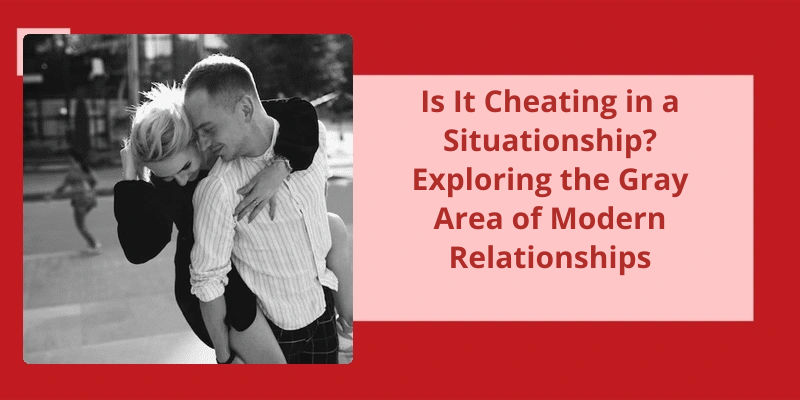Situationships have become increasingly popular in modern dating culture, where two individuals form a romantic connection without explicitly committing to a traditional relationship. In a situationship, there are no definitive guidelines or expectations, creating a potential grey area when it comes to defining boundaries and rules. With this ambiguity, the question arises: can you cheat in a situationship? While technically not exclusive, situationships often entail emotional and physical intimacy, leaving room for hurt feelings and deceit if either party engages with someone else intimately. This dilemma raises the ethical question of whether it’s acceptable to engage in extracurricular activities when you and your partner haven’t established strict guidelines on exclusive involvement. So, what constitutes cheating in a situationship, and is it a breach of trust? Let's explore this divisive topic further.
How Do You Know if a Situationship Is Toxic?
, I was going through my old journals and came across some entries about a situationship that I’d with a guy a few years ago. We were never official, but we’d a lot of chemistry and we liked each others company. However, looking back, I realized that it wasnt a healthy situationship, and it left me feeling drained and unhappy most of the time.
One of the major signs of a toxic situationship is the lack of clarity. If youre never sure about where you stand with the other person, or if you feel like youre always walking on eggshells around them, then chances are that the situationship isn’t healthy. Additionally, if the other person is always hot and cold towards you, or they only reach out when it’s convenient for them, then this is another red flag.
If you find that the other person is always demanding your time and attention, or theyre constantly putting you down or belittling you, then this can be a major drain on your energy and emotions. Additionally, if you find that youre always the one making the effort to keep the relationship going, or if you feel like youre always giving more than youre receiving, then this is another indication that the situationship isn’t healthy.
Ultimately, it’s important to remember that a situationship should enhance your life, not detract from it. If you find that the situationship is leaving you feeling more unhappy than happy, or if it’s affecting your mental health in a negative way, then it’s probably time to consider ending the relationship and focusing on yourself. Remember that you deserve to be in a healthy, fulfilling relationship, and if the other person isn’t able to provide that for you, then it’s time to move on.
Signs That Indicate a Situationship Is Turning Into a Toxic Relationship
A situationship turning toxic can be indicated by signs such as frequent arguments, lack of trust, controlling behavior, verbal or emotional abuse, and feeling anxious or drained around the other person. It’s important to address these issues early on and seek help if necessary to prevent escalation.
While some may think the definition of cheating is clear-cut, there are many different actions that can be considered unfaithful in a relationship. From physical intimacy to emotional connections, determining what constitutes cheating can vary from person to person. In this article, we will explore some common behaviors and situations that are often viewed as cheating in a romantic relationship.
What Can Be Considered as Cheating?
This breach of trust can result in various consequences, such as the breakup of the relationship or severe emotional distress. While the definition of cheating can vary depending on cultural and personal values, many individuals consider certain behaviors to be a form of cheating, such as kissing, flirting, sexting, or having sex with someone else other than their partner.
However, cheating can extend beyond physical or sexual misconduct. Some people may consider emotional affairs or developing close friendships with others as a form of infidelity that undermines the intimacy and trust within a relationship. Another type of infidelity that can be considered cheating is financial infidelity, where a partner hides or lies about their spending, debts, or income.
Furthermore, some individuals may consider fantasizing or viewing pornography as a form of cheating since it involves a form of intimacy with someone outside the relationship. In contrast, others may believe that as long as there’s no physical or emotional involvement with others, it doesn’t qualify as cheating.
However, it’s crucial to communicate and establish clear boundaries with ones partner to avoid misunderstandings, distrust, and hurt feelings. Open communication and honesty are vital aspects of a healthy relationship and can prevent infidelity from occurring or heal the damage caused by cheating.
Source: Signs of Cheating: 10 Signs to Look For – WebMD
While defining the terms of a relationship can help avoid misunderstandings, many couples still struggle with the concept of exclusivity. It’s natural to wonder if it’s okay to see other people while exclusively dating someone. In this article, we’ll explore the nuances of exclusivity and whether or not cheating can occur in such a situation.
Can You Cheat While Exclusively Dating?
However, if youve both agreed to be in a monogamous relationship, then cheating is most definitely a possibility. It’s important to establish boundaries and have open communication about what you both consider cheating. This can be an uncomfortable conversation, but it’s necessary for a healthy and respectful relationship.
While it may be tempting to cheat, it’s important to consider the consequences. Cheating can damage trust and cause emotional pain for your partner. It can also lead to the end of the relationship. If you find that youre not satisfied in your current relationship, it’s important to address those feelings and have an honest conversation with your partner about how youre feeling.
One common reason people may cheat while exclusively dating is a lack of emotional or physical intimacy in their current relationship. In this case, it’s important to figure out if there are underlying issues causing the lack of intimacy and address them before considering cheating.
Cheating can also be a sign of deeper issues within oneself, such as low self-esteem or a fear of commitment. It’s important to reflect on why you may be considering cheating and address those underlying issues to prevent it from happening in the future.
In today’s world, relationships can get complicated, and the rules are constantly evolving. The concept of micro-cheating is one such development that’s gaining attention in the realm of infidelity. While it may seem harmless at first, it can quickly spiral out of control, leading to more significant issues. So, what exactly is micro-cheating, and why is it considered almost cheating? Let’s take a closer look.
What Is Considered Almost Cheating?
Some examples could be following your ex-fling on social media and consistently liking their pictures or DM”ing someone you find attractive. While these may seem harmless, they can cause a lot of harm and insecurity in a relationship. It’s important to have open communication with your partner and ask for their boundaries and expectations.
For some, micro-cheating could be as simple as having a close relationship with a coworker and spending a lot of time with them outside of work hours. It’s also important to be aware of any jealousy or insecurity your partner may have.
Sending flirty texts or having a secret online profile can also be considered micro-cheating. These actions can create a sense of betrayal and distrust in a relationship. It’s important to remember that it’s not just physical actions that hurt a relationship, emotional infidelity can be just as damaging.
At the end of the day, every relationship is unique and it’s up to the individuals involved to establish boundaries and expectations. It’s important to remember that if something makes your partner uncomfortable, it’s worth reevaluating the behavior and making changes. If either partner feels that boundary crossing has occurred, it’s best to have open, honest conversations in order to address the issue and move forward in a healthy way. By being mindful of micro-cheating and establishing clear boundaries, couples can build trust and a strong foundation for a healthy and happy relationship.
How to Effectively Communicate With Your Partner About Boundaries and Expectations
Communicating with your partner about boundaries and expectations is an important part of any healthy relationship. It’s essential to approach the conversation with openness, honesty, and respect. Make sure to actively listen to each other’s needs and concerns without judgment or defensiveness. Clearly define what you’re comfortable with and what you’re not, and strive for mutual understanding and agreement. Remember that communication is an ongoing process and be willing to revisit the conversation as needed.
Additionally, there’s often a lack of communication about the true nature of the relationship, leading to misunderstandings and hurt feelings. As situationships become more popular, it’s important to consider the potential drawbacks and prioritize clear communication with your partner.
What Is Wrong With a Situationship?
This can lead to hurt feelings, confusion, and the eventual breakdown of the relationship. Situationships also lack clear boundaries, which can make it difficult to know where each partner stands in the relationship. This can lead to feelings of insecurity, anxiety, and other negative emotions.
Another disadvantage of a situationship is that it can limit each partners ability to form deeper connections with other people. Since the relationship isn’t defined, it can be difficult for one or both partners to fully invest in the relationship and commit to it. This can prevent them from forming meaningful connections with others, which can ultimately lead to feelings of loneliness and isolation.
In some cases, situationships can also be physically risky. Without clear boundaries and expectations, it can be easy for one or both partners to engage in behavior that’s unsafe or even dangerous. This can put both partners at risk, both physically and emotionally.
Lastly, situationships can prevent individuals from fully healing and moving on from past relationships. Without clear boundaries and expectations, it can be difficult to fully let go of the past and embrace a new relationship. This can lead to feelings of sadness, regret, and even depression, which can ultimately impact the health and well-being of both partners.
Navigating the waters of modern day relationships can be confusing, especially when it comes to the fine line between a situationship and a relationship. While these terms may seem interchangeable, it’s important to note that they aren’t one in the same and have different implications for those involved. Let’s take a closer look at what distinguishes a situationship from a relationship.
Is My Situationship a Relationship?
In a situationship, the lines between friendship and romance are often blurred, leaving both parties unsure of where they stand with one another. This can lead to a lot of confusion and mixed emotions, especially if one person is more invested in the relationship than the other. Without clear boundaries or expectations, situationships can quickly become complicated and difficult to navigate.
One of the biggest challenges of being in a situationship is figuring out whether or not it’s actually a relationship. While there may be some level of emotional intimacy and physical connection, the lack of commitment and defined roles can make it hard to know where you stand. Without clear communication and mutual understanding, it can be easy to misinterpret each others actions and intentions.
If youre wondering whether your situationship is a relationship, it’s important to have an open and honest conversation with your partner. Ask them what they see the future of your relationship being and whether they’re interested in taking things to the next level. If they aren’t interested in committing or don’t see a future together, it may be time to reevaluate your own feelings and priorities.
Ultimately, the decision to turn a situationship into a committed relationship is one that should be made based on mutual respect, trust, and compatibility. If both parties are willing and able to make the necessary sacrifices and compromises, it can be a rewarding and fulfilling experience. However, if one person isn’t on board or there are unresolved issues that can’t be overcome, it may be better to cut ties and move on.
By being honest and upfront with yourself and your partner, you can make the best decision for your own emotional well-being and happiness. Whether you choose to continue the relationship or move on, remember to prioritize your own needs and feelings above all else.
Conclusion
In conclusion, the concept of cheating in a situationship is a gray area, as there are no set rules or boundaries established. While it can be argued that engaging in intimate or emotional activities with someone outside of the situationship goes against the unspoken expectations and can lead to becoming hurtful, it’s ultimately up to the individuals involved to communicate and establish their expectations and boundaries. It’s crucial to have open and honest communication to avoid misunderstandings and hurt feelings.






